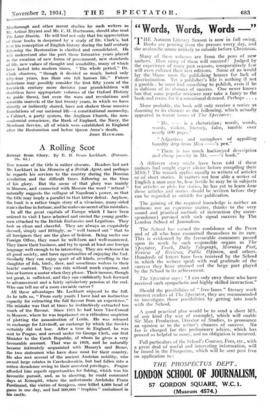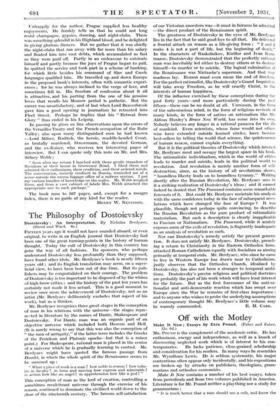A Rolling Scot
Retreat from Glory. By R. 1i. Bruce Lockhart. (Putnam. 10e. 6d.)
TILE reason of the title is rather obscure. Readers last met Mr. Lockhart in his Memoirs of a British Agent, and perhaps lie regards his services to the country during the Russian revolution and the difficult times following as the time of his glory. But the scene of that glory was mainly in Moscow, and connected with Moscow the word " retreat " naturally suggests the collapse of Napoleon's power, so that the title may imply a parallel to that bitter defeat. Anyhow, the book is a rather tragic story of a vivacious, many-sided man's decline in fortune, and he makes no secret of his mistakes.
In all the great capitals of Europe which I have been ordered to visit I have admired and envied the young gentle- men attached to the British Embassies and Legations. They look so clean and cheerful. They are always so exquisitely dressed, simply and fittingly, so " well turned out " that to all foreigners they are the glass of fashion. Being under our Foreign Office, they must be well-born and well-mannered. They know their business, and try to speak at least one foreign language well enough to be interesting. They are welcomed in all good society, and have opportunities of enjoying the bad. Similarly they can enjoy sport of all kinds, revelling in the slaughter of fish, birds, deer, and sometimes wolves to their hearts' content. They can ride without much expense, and hire or borrow a motor when they please. Their income, though not great, is sufficient, and they can confidently look forward to advancement and a fairly satisfactory pension at the end. Who can tell me of a more enviable career ?
All these advantages Mr. Lockhart enjoyed to the full. As he tells us, " From early youth I have had an instinctive capacity for extracting the full flavour from an experience." His mistake was that at times he instinctively extracted too much of the flavour. Since 1911 he had been Vice-Consul in Moscow, where he was imprisoned on a ridiculous suspicion of plotting the assassination of Lenin. He was released in exchange for Litvinoff, an exchange by which the Soviets certainly did not lose. After a tune in England, he was sent to Prague, and served under Sir George Clerk, our first Minister to the Czech Republic, of whom he gives a very favourable account. That was in 1919, and he naturally became intimately acquainted with Masaryk and Benes, the two statesmen who have done most for their country. He also met several of the ancient Austrian nobility, who owned large estates in Czechoslovakia, but had fallen into a rotten decadence owing to their ancestral privileges. Prague afforded him superb opportunities for fishing, which was his favourite pursuit, and, as to shooting, he could command days at Konopi.s4t, where the unfortunate Archduke Franz Ferdinand, the victim of Serajevo, once killed 4,000 head of game in one day, and had 300,000 " trophies " embalmed in his castle. *Unhappily for the author,' Prague supplied less healthy enjoyments. He frankly tells us that he could not long resist champagne, gypsies, dancing, and night-clubs. There
was something splendid in his Highland blood, and he delighted in giving glorious dinners. But we gather that it was chiefly the night-clubs that ran away with far more than his salary and floated him into vast debts, which accumulated as fast as they were paid off. Partly in an endeavour to extricate himself and partly because the joys of Prague began to pall, he quitted the service and took part in a scheme of banking, for which little besides his command of Slav and Czech languages qualified him. He travelled up and down Europe in the proposed bank's interests, often with romantic experi- ences ; for he was always inclined to the verge of love, and sometimes fell in. His freedom of confession about it all is attractive, and his parting from the one of his genuine loves that recalls his Moscow period is pathetic. But the career was unsatisfactory, and at last when Lord Beaverbrook gave him a good opening in journalism he retreated into Fleet Street. Perhaps he implies that his " Retreat from Glory " thus ended in his Leipzig.
In passing he gives us fine observations upon the errors of the Versailles Treaty and the French occupation of the Ruhr Valley; also upon many distinguished men he had known —Lord Milner, Raditch, the heroic, muddle-headed Croat, so brutally murdered, Stresemann, the devoted German, and the ex-Kaiser, who receives ten interesting pages of interview. But I can quote only this note on Mr. and Mrs.
Sidney Webb :
" Soon after my return I lunched with those gentle crusaders of Socialism at their house in Grosvenor Road. I liked them and admired their enthusiasm, their erudition, and their ordered minds. The conversation, entirely confined to Russia, reminded me of a scene outside the excess luggage office of a railway station. I put my various bundles of knowledge on the scales. Mr. Webb weighed them, and from a vast cabinet of labels Mrs. Webb attached tho appropriate one to each package."
The book runs to 367 pages, and, except for a meagre index, there is no guide of any kind for the reader.
HENRY W. NEVINSON.















































 Previous page
Previous page